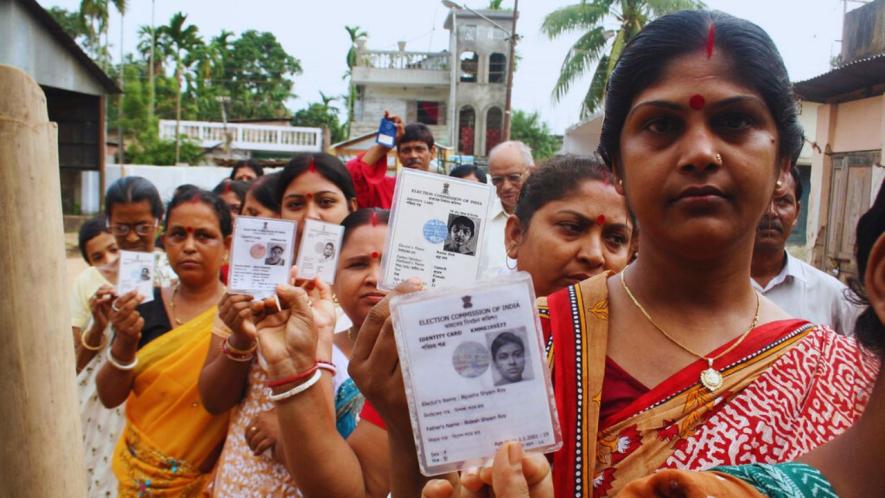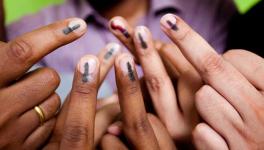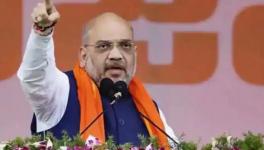Bihar: Agency to Autonomy to Political Authority: Pipe Dream for Women Voters

Representational Image. Image Courtesy: Flickr
Women voters have the agency to elect, but their autonomy to elect without external restrictions is absent. Therefore, the demand for political authority that leads them to the halls of power remains missing. The Bihar Assembly election verdict and the recent National Democratic Alliance (NDA) cabinet formation exemplify this argument.
The women’s vote percentage in Bihar was a whopping 71.6%, compared with 62.8% for men. This showed that women became the decisive vote bank behind the winning Nitish Kumar-led NDA alliance. However, women MLA representation in the 18th Bihar Assembly is low -- 29 out of 243 -- and the Nitish cabinet has only three women ministers.
There is a drastic mismatch between women’s participation as voters and their representation as political leaders in the Assembly and cabinet. Women in Bihar have become politically aware about the strength of their vote; they know they have the agency to elect their own leaders even against the wishes of their kin and caste networks.
The conundrum is that this agency is not autonomous. Women’s choices are restricted by issues, such as caring for family, buying groceries, ensuring children’s health and nutrition, and, if possible, saving up money for a rainy day. Thinking about political representation and power becomes a secondary issue when their autonomy is hindered by family responsibilities. So, any party promising them ‘freebies’, policies, and schemes to fulfill these demands, which ideally in a country like India should be a government’s responsibility as part of its governance initiatives for the marginalised population, becomes a compromised choice for women voters.
Bihar politicians in the patriarchal corridors of power exploited this situation. The Rs 10,000 in their bank account, free bicycles, reservation in local bodies, quota in police recruitment, and quota for widowed and disabled women were some steps announced and fulfilled by the NDA before the elections to sway the women’s vote bank in its favour. Here, women voters’ autonomy is hindered, as they vote not keeping political representation as their priority, but based on who will help to take care of their children and family. The double burden of earning and taking care of the family falls on many women in Bihar.
During an interview with Pinky (name changed), an upper caste woman in her early 30s, originally from the Buxar region, who owned a beauty parlour in Patel Nagar and a branch in Buxar, where she had employed other women, brought this issue to light. When asked why she was supporting Nitish Kumar, she replied, “He is the only one who has taken care of our issues, we recently got the monetary support for business, although 10000 is not enough for a new business, except to may be buy a goat, but I can use it to buy some supplies for my parlour.”
As the conversation continued, she mentioned that she takes care of her family, is responsible for all household chores, and is even the sole earner. When asked what her husband or father-in-law does, she hesitantly said: ‘Dekh rahe hai kuch’ (He is looking for some work).
This is one among many interviews that I had with women around Patna, who seem to be prioritising family and welfare. The narrative to attain representation, political equality, and power was non-existent in prospective women voters’ narrative in comparison to their male counterparts, for whom power and representation of them and their caste and communities was a variable in making choices, meaning they are not always burdened by the caretaking needs of the family as such, and could make autonomous choices.
When the agency to choose representatives autonomously was missing for women voters in Bihar, the idea of holding political authority became insubstantial. Women are forced to prioritise their family’s welfare, and their demand to ask for a seat at the table dissipates, providing a leeway and an excuse to the incumbent political elites functioning in a patriarchal arrangement to only give to the women “what they demand”.
Kasturi Devi (name changed), a woman in her late 60s and a Lok Janshakti Party worker who had dedicatedly worked for the party for more than three decades, shared that holding power for women is still a pipe dream. She said, “After working most of my life for the party, I kept requesting the senior leaders of the party for a ticket. Their response would always be, “What will you do with a ticket? We are taking care of you and your family. We will also help your son get a job. Don’t you want that? It will help your family way more than a ticket.”
She excitedly showed me the Facebook page of her son, who sang for small events and had a following of a couple of thousand. She made sure that at least all local party leaders invited him to sing at their events. The irony is that, at the ground level, she is still responsible for door-to-door campaigns and for building and mobilising networks with people from at least three constituencies. However, she gave up her political dream for a stable job to support her son.
The deep structural issue is that women cannot demand space in power positions because their priorities still centre on care work. And this is not their autonomous choice but a situation they are forced into due to their marginalised position, which is then portrayed as their genuine political demand. In reality, they are limited to bargaining their vote for promises that improve their living conditions, rather than actual representation and political authority.
This is visible across women from all caste groups in Bihar, more so among Bahujan Dalit women as a result of their intersectional identity with overlapping caste, gender, and class, which creates instances of discrimination and exclusion. The number 3 in the NDA cabinet and 29 in the Bihar Assembly are the result of the dreary situation of women in the deep-seated patriarchal setup of politics.
For women voters in Bihar and India, the need of the hour is a transition from mere agency to participate and vote to autonomous electoral choice, and from autonomy to asserting real political authority, which can be reflected in the corridors of power.
The writer is a PhD candidate at the Department of Sociology, Yale University, New Haven, US. The views are personal.
Get the latest reports & analysis with people's perspective on Protests, movements & deep analytical videos, discussions of the current affairs in your Telegram app. Subscribe to NewsClick's Telegram channel & get Real-Time updates on stories, as they get published on our website.
























